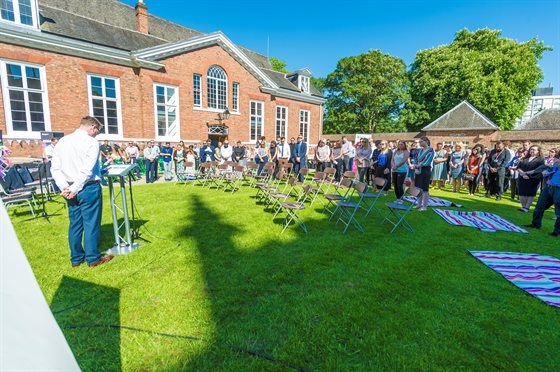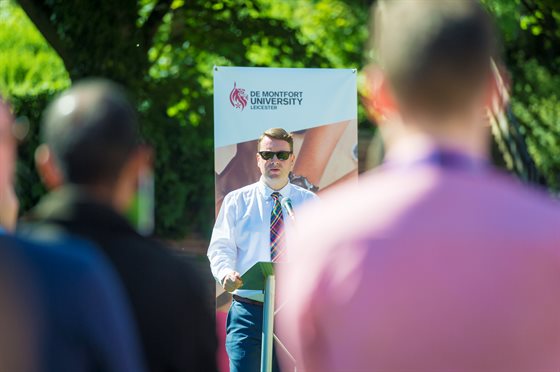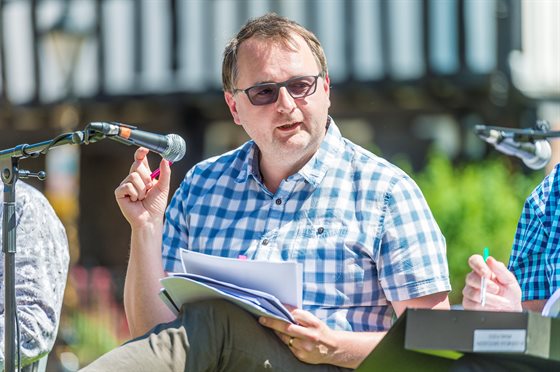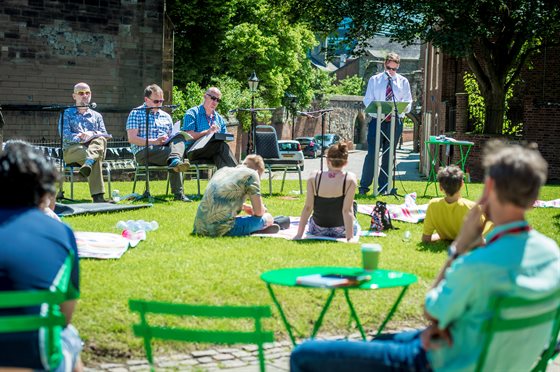Leading academics from De Montfort University Leicester (DMU) have led a day-long debate on the biggest issues ahead of next month’s General Election.
With only a few weeks to go until the country goes to the polls, DMU Vice-Chancellor Professor Dominic Shellard led a series of outdoor discussions under bright blue skies, analysing the three main party manifestos and encouraging young people to use their vote.

The event - held on the lawn out the front of Leicester Castle Business School from 10am to 4pm - was also used to launch another manifesto: DMU’s.
This document was drawn together from the expert analysis and impassioned opinion generated during the 24-hour Be The Change event held at the university at the beginning of the month.

Brexit, the economy, the NHS and higher education are among the critical issues tackled in the document, which you can read here.
The event, which began with a two-minute silence to remember the victims of Monday's suicide bombing in Manchester, was an opportunity for staff and students to join in a discussion about the ways in which the main political parties would take the country forward.
At midday, Professor Shellard began the event by outlining what DMU’s manifesto was.
He said: “This is the first election in my memory in which so many different propositions are on offer to voters.
“Our manifesto gathers together all the comments made during Be The Change. It is a rich and fertile document reflecting many different views.”

The first panel discussion was around the Liberal Democrat manifesto.
Deputy Vice-Chancellor Professor Andy Collop said: “It’s an interesting document; it seems to have been shaped by the period when the Lib Dems were in coalition government with the Conservatives.
“They are positioning themselves as the official opposition, recognising that Theresa May will be Prime Minister after this election.”
At 12pm, the panel switched and the debate was this time around Labour’s manifesto.

Professor Richard Hall, DMU’s Co-Director of the Institute for Education Futures, said he felt Labour were advocating “direct democracy”.
He said: “They talk in it about supporters taking ownership of football clubs and about a fairer or more democratic engagement at work as a kind of co-operative.
“They seem to be going back to what citizenship really means in this.”
Business and Law senior lecturer Fred Mear said that while the Labour manifesto was written in a radical rhetoric, it was “not that radical in reality” and that “economically, it’s really quite centralised.”

Finally, at 2pm, the conversation moved to the Conservative’s campaign.
Jonathan Davies, Professor of Critical Policy Studies said he felt that Conservatives had run a “really bad campaign”.
He said: “The focus of the campaign around Theresa May’s personality is starting to unravel.”
On the controversial issue of social care – which under Conservative policy would see older people pay for care in their own home unless they have less than £100,000 in assets – Professor Nigel Wright said he was glad to see the topic being addressed.
He said: “We could be cynical but when the manifesto first came out there was a preparedness to tackle some real issues.
“Social care has been broken for 10 years under successive Labour and Coalition governments but here in the Conservative manifesto they were offering a solution.
“They have tried to address it but not in a good way.”
Posted on Friday 26 May 2017